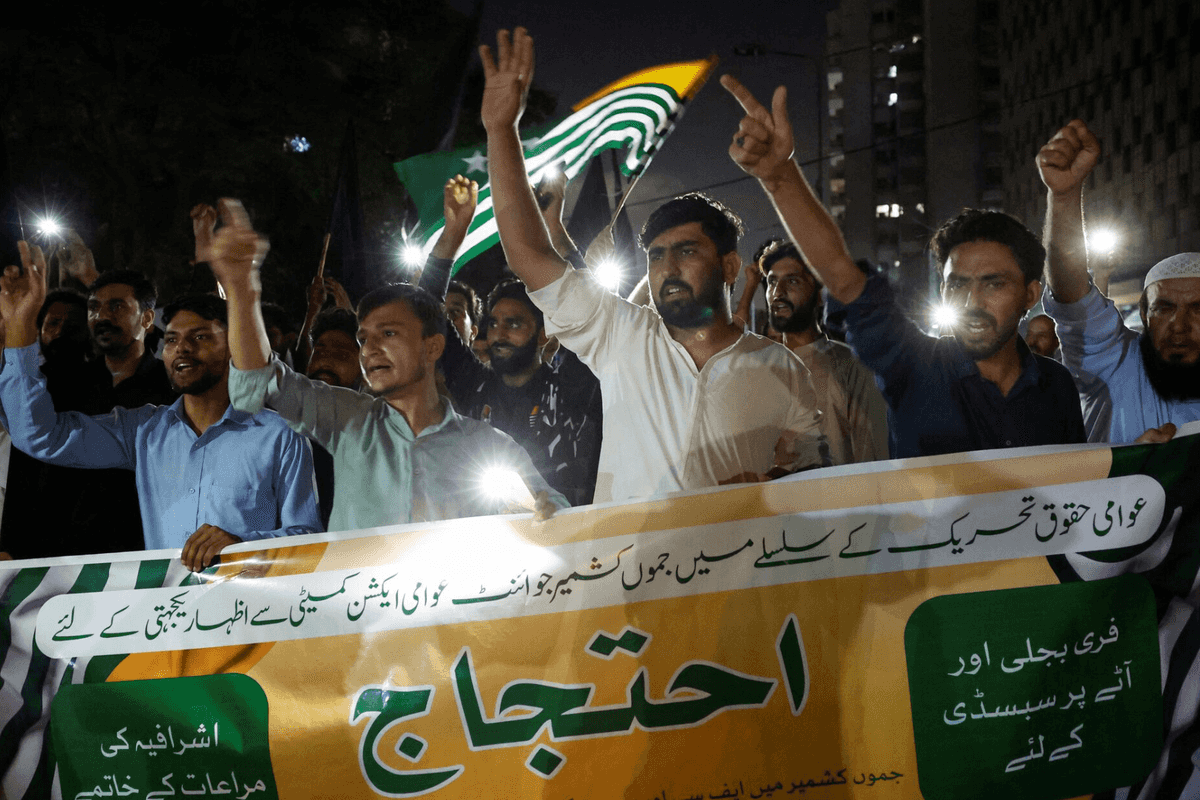Islamabad dispatches ministers to mediate Kashmir unrest
Protesters warning of full lockdown if demands are not met
News Desk
The News Desk provides timely and factual coverage of national and international events, with an emphasis on accuracy and clarity.

Javed Hussain
Correspondent
I have almost 20 years of experience in print, radio, and TV media. I started my career with "Daily Jang" after which I got the opportunity to work in FM 103, Radio Pakistan, News One, Ab Tak News, Dawn News TV, Dunya News, 92 News and regional channels Rohi TV, Apna Channel and Sach TV where I worked and gained experience in different areas of all three mediums. My journey from reporting to news anchor in these organisations was excellent. Now, I am working as a correspondent with Nukta in Islamabad, where I get the opportunity of in-depth journalism and storytelling while I am now covering parliamentary affairs, politics, and technology.

File photo: People hold a banner as they chant slogans in support of an alliance of civil rights groups protesting in Pakistan-ruled Kashmir, demanding the government give the region a subsidy on electricity and wheat prices in the face of rising inflation, during a demonstration in Karachi, Pakistan
reuters
Pakistan’s prime minister on Wednesday instructed two federal ministers to mediate between the government of Pakistan-administered Kashmir and a coalition of civil society groups leading growing protests in the region, officials said Wednesday.
The step by Prime Minister Shehbaz Sharif follows weeks of demonstrations organized by the Joint Awami Action Committee, or JAAC, whose leaders say their key demands remain unaddressed.
The protests have intensified in recent days after negotiations with the local government stalled, with the committee warning of a full lockdown beginning September 29 if no progress is made.
Sharif has appointed Parliamentary Affairs Minister Tariq Fazal Chaudhry and Minister for Kashmir and Gilgit-Baltistan Affairs Amir Muqam to represent the federal government in talks.
“The Government of Pakistan wants to help bring the parties closer in this process and resolve the issues amicably,” a statement from the Prime Minister’s Office said.
What are the demands?
Authorities say some JAAC demands have already been accepted, including the provision of subsidized wheat flour and a reduction in electricity prices, which had been flashpoints of earlier demonstrations.
But protesters say other key issues remain unresolved.
The coalition is pressing for the abolition of reserved refugee seats in the legislative assembly, which it argues are often used for political manipulation by sending non-Kashmiris into the body.
It is also calling for the withdrawal of perks and privileges enjoyed by the prime minister, cabinet, and senior officials in the region. Other demands include fair distribution of local resources, greater transparency in governance, and curbs on corruption.
History of protests
The movement traces its roots to economic grievances. In mid-2023, protests erupted after the government doubled the price of flour and later hiked electricity tariffs.
Those demonstrations, which spread from Rawalakot to Muzaffarabad and Mirpur, eventually led to the formation of JAAC.
Since then, the group — an alliance of lawyers, traders, students, and civil society members — has spearheaded repeated strikes and marches.
Tensions reached a peak in May 2024, when thousands joined a long march to Muzaffarabad demanding cheaper electricity and flour subsidies.
Clashes broke out after authorities deployed paramilitary forces, leaving several protesters and police officers dead. The unrest prompted Pakistan’s federal government to announce a subsidy package worth PKR 23 billion ($83 million), but demonstrations have continued intermittently.
Rights groups say the protests reflect deep-rooted socioeconomic and political frustrations.
A fact-finding report by Pakistan’s Human Rights Commission concluded that the local government’s heavy-handed response, including arrests and the use of force, had inflamed public anger.
Analysts warn the current wave of protests could worsen if the latest negotiations fail.







Comments
See what people are discussing